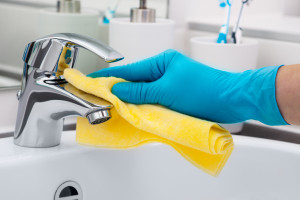What are the Signs a Softener isn’t Working Properly?
1. Seeing hard water spots: Generally, with softened water you shouldn’t be cleaning hard water spots off your shower door. If you’re fighting scale and mineral buildup, have your unit serviced to ensure it’s functioning properly and the settings are correct. 2. Water Doesn’t Feel Soft: If you’ve ever had a water softener in
your home, you can immediately feel the difference when soft water stops
flowing. You may feel dry and itchy after a shower or find you can hardly get a suds to form in the kitchen sink. First, check to make sure you have plenty of salt pellets in your brine tank. If there’s salt in the tank, this may be an indicator that your system has stopped softening and needs to be serviced.
2. Water Doesn’t Feel Soft: If you’ve ever had a water softener in
your home, you can immediately feel the difference when soft water stops
flowing. You may feel dry and itchy after a shower or find you can hardly get a suds to form in the kitchen sink. First, check to make sure you have plenty of salt pellets in your brine tank. If there’s salt in the tank, this may be an indicator that your system has stopped softening and needs to be serviced.3. Change in Water Pressure or Water Quality: If you notice a reduction in water pressure or even simply a change in the quality of your water (perhaps you’re suddenly seeing staining on your porcelain tub), you should immediately call for your water conditioner/softener to be serviced.
What to do When Your Water Softener isn't Working
Call a Pro.
To ensure that your softener is working properly, we recommend that you have your softener inspected by a local plumber at least once each year. A professional will make sure the valve is functioning properly, all settings are optimized, and possibly even conduct a water test to make sure that your system is still the right match for your home’s water.But aside from the annual service call, there may be other times when you’re not sure if your softener is functioning properly.
Weighing the Costs
Like all household appliances, water softeners eventually wear out. If you’re finding that you’re having to call to have your softener serviced often and the repair parts and labor are adding up, it may be time weigh the costs. Do you pay to have the unit serviced and repaired or is it time to upgrade to a new softening system? Here are a few things to consider over the lifetime of your unit:
Media –
The grade of media used in softeners vary with each manufacturer. Most
softeners utilize six, eight or ten-percent crosslink resins. The higher
the resin percentage, the greater the resin durability. Every time a
softener regenerates, the resins wear down a little. It also wears down
from exposure to chlorine. With time, the media will need to be
replaced which can cost up to $500. Check with your softener
manufacturer to determine if media replacement is covered by their warranty.
Consumables
– Some water softeners use both cation resins and carbon media in their
resin tanks. The cation resin is there for the softening process and
the carbon media is there to improve the taste and smell of the water
by reducing chlorine and other chemicals/contaminants. The trouble is
that carbon wears out and needs to be replaced about every two – three
years (cation resins generally last longer). But because most softeners
mix the media and carbon, both have to be disposed of and this can be
very expensive.
Control Valve – the
control valve is the “brain” of your softener. It tells the unit when
to recharge or regenerate, rinse, and track water consumption. Like all
machines with moving parts, parts of the valves eventually wear out and
need replacing.
Lack of Efficiency
– Old, outdated softeners can be inefficient and costly. This
inefficiency can translate to hundreds of dollars spent each month on
higher water bills (due to excess water being used), increased salt usage (system is isn’t working properly and is regenerating more often than needed), and higher energy bills.
Service Costs – Calling your local water treatment specialist
all the time for service is like always having a car in the shop.
Eventually you want to stop dumping money into the car and get a new
one. Read your softener warranty carefully to determine what is covered for parts and labor.
 Household Changes
– Take into consideration how your household has changed in the past
10(?) years since you purchased your softener. Have the kids gone away
to college? Do you now have three toddlers running around? Your softener
may have originally been sized for the number of people in your home at
the time of purchase. Most water softeners today are sized per the
number of people in the household, but carefully monitor increases or
decreases in water consumption to determine how often to regenerate.
These features can save you a bundle.
Household Changes
– Take into consideration how your household has changed in the past
10(?) years since you purchased your softener. Have the kids gone away
to college? Do you now have three toddlers running around? Your softener
may have originally been sized for the number of people in your home at
the time of purchase. Most water softeners today are sized per the
number of people in the household, but carefully monitor increases or
decreases in water consumption to determine how often to regenerate.
These features can save you a bundle.Article by Watertech.com

No comments:
Post a Comment